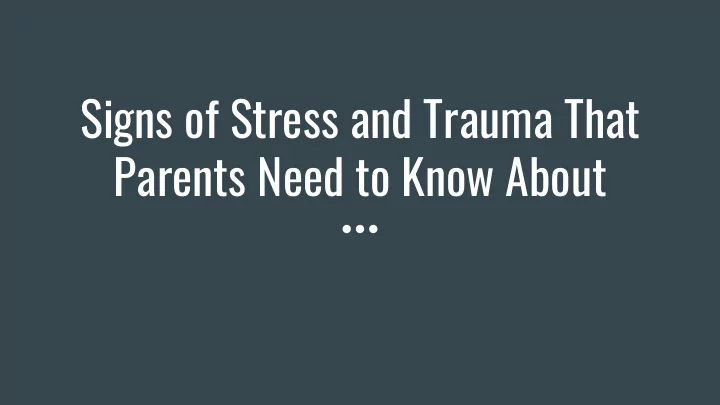

Signs of Stress and Trauma That Parents Need to Know About
Warning Signs to Look For ● Preschoolers Thumb sucking ○ Bedwetting ○ Clinging to parents ○ Sleep Difficulties (Trouble falling asleep, nightmares) ○ Separation Anxiety ○ Fear of the dark ○ Regression in behavior ○ Withdrawal ○
Warning Signs to Look For Preschoolers ● You can help your child by labeling their feelings and providing validation (For Example: “I ■ can see that you are upset because you can’t have your friends over; how do you think you can stay in touch with them?”) Try to give a brief but honest response. Parents should be mindful about talking about the ■ pandemic with others when their child is present. Limiting media exposure can also be helpful, as it can be overwhelming and confusing for young children to be repeatedly exposed to images or information. Maintaining consistency and familiarity whenever possible with virtual school time, mealtime ■ and bedtime. As children often take their emotional cues from key adults in their lives, it is important that ■ adults manage their own emotions well and remain calm, listen to children’s concerns, speak kindly, while reassuring them you are there for them no matter what. Offer extra hugs and say “I love you” more often, these times are when they most need it. ■
Resources for Preschooler Parents Social stories are commonly used for children on the spectrum to depict a social situation that your child may encounter. It is a great idea to print some of these and make them into a book you can read to your kids, especially little ones that don’t read yet but will take advantage of the visuals representing our “new normal” daily life. https://www.autismlittlelearners.com /2020/07/covid-19-related-stories-for -schools.html
Warning Signs to Look For Elementary Aged Children ● Irritability ○ Aggressiveness ○ Clinginess ○ Nightmares ○ Separation Anxiety ○ Poor Concentration ○ School Avoidance ○ New fears ○ Withdrawal from activities and friends ○ Physical Complaints ○
Warning Signs to Look For Elementary Aged Children ● Younger children are more likely to act out their stress, anxiety, or fear through their ■ behavior. These emotions are not to be ignored. They must learn from us that having emotions, positive or negative, is good. Talking about them is necessary, and being honest with them is healing. In a calm and reassuring voice, tell them where you are going, how long you will be gone, ■ when you will return and that you are taking steps to stay safe. Set aside some special time with each child. You choose the time and let your child choose ■ the activity, a couple of minutes of your undivided attention will mean a lot.
Warning Signs to Look For ● Adolescents Sleeping and eating disturbances ○ ○ Agitation Increase in conflicts ○ ○ Delinquent behavior Poor Concentration ○ ■ Teenagers may want to have more information and may need to talk more. Alternatively, they may act as though nothing is bothering them and may say they do not want to talk. Give them space, but also keep a close eye on how they are coping, and create opportunities for discussion. ■ Talk about how they’re feeling during the pandemic. Watch for signs they are struggling and may need more support. ■ Help them look forward by helping them shift away from what was lost and identify ways to move on with plans and goals.
The Signs - Suicide Awareness https://www.youtube.com/watch?v=dHHzJ5jqjN8&feature=youtu.be
Resources As a parent, you know your child best, and you should reach out to a mental health provider if you have concerns about your child’s reactions, your ability to help them, or if you feel overwhelmed by your own reactions. Community Resources for help: If you suspect your child is in immediate danger of hurting themselves please call 911. ● Mobile Crisis (518)-943-5555 ● Over the phone support 8am-10pm daily for anyone needing services ○ They provide Safety Assessments, Functioning Assessments, Welfare Checks, De-escalation and ○ additional resources for COVID-19 National Suicide Prevention Lifeline: 1-800-273-8255 (TALK) ○ Español 1-888-628-9454 ■ Crisis Text Line: Text HOME to 7417441 ● Crisis Text Line is here for any crisis. A live, trained Crisis Counselor receives the text and ○ responds, all from a secure online platform. The volunteer Crisis Counselor will help you move from a “hot moment” to a “cool moment”.
School Resources If you have any general questions or concerns regarding your child, or if you feel they would ● benefit from emailing or speaking with one of our School Psychologists or School Counselors, their emails are listed below. Kelly Bins: KBins@ichaboscrane.org (PS School Psychologist) Amy Stephenson: AStephenson@ichabodcrane.org (PS School Counselor) Erin Mitchell: EMitchell@ichabodcrane.org (MS School Psychologist) Laura Sarno: LSarno@ichabodcrane.org (MS School Psychologist) Kasey Conklin: KConklin@ichabodcrane.org (MS School Counselor) Dale Tuczinski: DTuczinski@ichabodcrane.org (MS School Counselor) Beth Ruiz: BRuiz@ichabodcrane.org (HS School Psychologist) Joan White: JWhite@ichabodcrane.org (HS School Counselor) Amanda DeAloe: ADealoe@ichabodcrane.org (HS School Counselor)
Recommend
More recommend